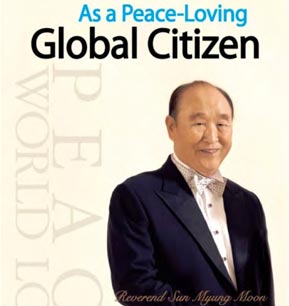ShareThis
Rev. Sun Myung Moon

As a Peace-loving Global Citizen is the autobiography of Rev. Sun Myung Moon, the founder of the Unification Movement. It was published in 2009 in both Korean and English by Gimm-Young Publishers of Seoul, South Korea. The book was released in South Korea on March 9, 2009 and debuted at #3 on the Businesss bestseller's list. It has ranked in various bestseller lists since then and was ranked 15th on the General bestseller's list as of October 14, 2009.
A Church with No Denomination
Within two months after we began our campus evangelical work, our congregation exploded in size, primarily with students from Ewha and Yonsei. The rate of growth was incredible. It was as if a spring breeze had blown through and changed the hearts of the students all in a moment. Dozens of Ewha students packed up their belongings and moved out of the dormitory. This happened on a single day. If someone tried to stop them, they would say, “Why? Why are you trying to stop me? If you want to stop me, you’ll have to kill me. Kill me!” They even came out by climbing the walls around the building. I tried to stop them, but it was no use. They did not want to be in their clean school; they wanted to be in our little church that smelled of dirty feet. There was nothing anyone could do about it.
Finally Dean Hwal Ran Kim (Helen Kim) sent Professor Young Oon Kim of the Department of Religious Social Welfare to our church. Professor Kim had studied theology in Canada and was a theologian in whom Ewha held out great hope for the future. Dean Kim chose Professor Kim because her specialty was theology, and she assumed she could develop a definitive critique of our theology that could be used to finally stop this influx of students. But a week after meeting me, this special representative, Professor Kim, joined our church and became one of our most enthusiastic members. This gave us even more credibility among the other professors and students at Ewha. Our membership numbers snowballed.
The situation grew out of control, and established churches resumed their accusations that we were stealing their members. This seemed unfair to me. I never told anyone to listen to my sermons or attend our church. If I chased people out the front door, they would come in the back. If I locked the doors, they would climb over the fence. I was powerless to stop them. The people most perplexed by this were the administrators of Yonsei and Ewha, who in turn were supported by Christian foundations. They could not stand by and do nothing as their students and faculty came swarming to some other religious group.
Monday, December 06, 2010
|
Labels:
A Church with No Denomination part5
|
CONTENT
- FOREWORD
- CHAPTER ONE - Food is Love
- CHAPTER TWO - A River of Heart Flows with Tears
- CHAPTER THREE - The Man with the Fullest Stomach
- CHAPTER FOUR - Why We Work Globally
- CHAPTER FIVE - True Families Create True People
- CHAPTER SIX - Love Will Bring Unification
- CHAPTER SEVEN - Future of Korea, Future of the Wor...
- CHAPTER EIGHT - Message for Young People
